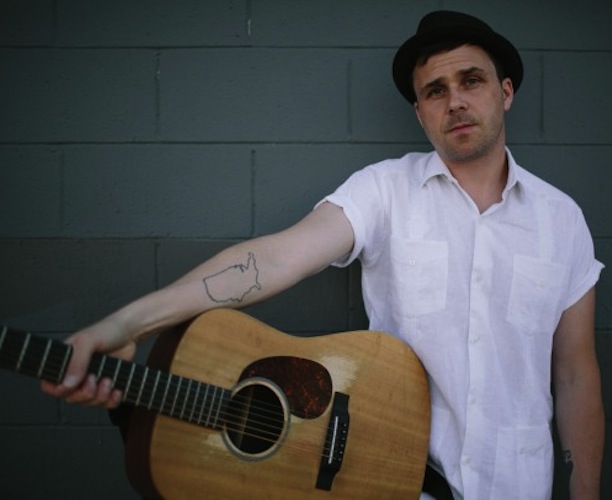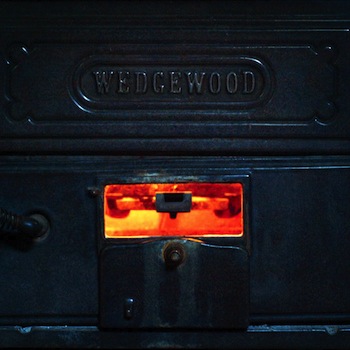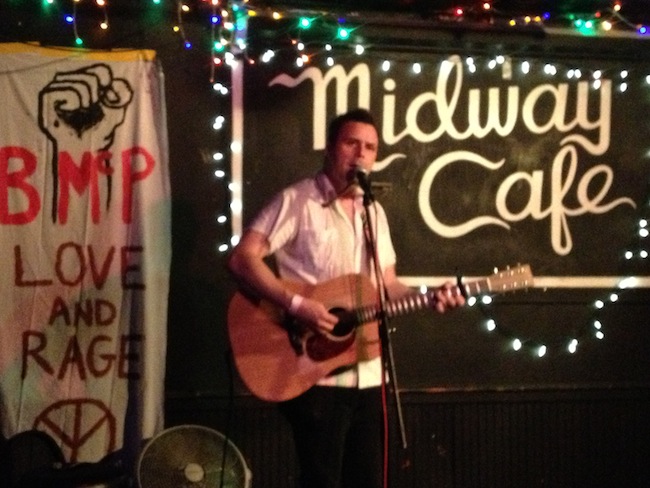Fuse Album Review: Singer Songwriter Bryan McPherson — Protester and Performer
Having toured the United States and Europe with The Dropkick Murphys, Bryan McPherson has come a long way from writing songs in the room next to mine in North Cambridge and then busking at Porter and Harvard Squares.

Bryan McPherson — a man and his guitar. Photo: courtesy of the artist.
By Blake Maddux
I was on my way to pick up my wife from the train station when I first listened to Boston native Bryan McPherson’s new album Wedgewood. The second or third song was playing when she got into the car. After we exchanged a few pleasantries, she asked, without my having volunteered any information, “Is this your old roommate?”
Not that she had never heard his music before, but it had been seven or eight years since Bryan and I had shared an apartment together. The fact that she was able to identify him within the space of about 15 uninterrupted seconds is proof enough that the originally-from-Dorchester-turned-Angeleno singer-songwriter is a literally and figuratively distinctive musical voice.
Much of Wedgewood is cut from the same cloth as 2012’s American Boy/American Girl, and rarely have I ever been so grateful for more of the similar. (McPherson’s first album, Fourteen Stories, came out in 2007.)
While his previous album served as a sort of soundtrack for the Occupy movement, Wedgewood functions as a well-timed score for an era in which law-abiding unarmed citizens – usually African-Americans but, as the evocative track “Kelly Thomas” indicates, not always – have all the more reason to be terrified at the sight of a police officer.

“Days of Rage,” the second song, is one of the main pillars of the album. As such, it encapsulates elements of all that is attractive and potentially off-putting about McPherson as a protester and performer. He is expert at co-mingling religious and political imagery via earnestness and clever wordplay. While an extensive vocal range is never going to be McPherson’s forte, he does well with what he has, as the chorus of the song demonstrates. Finally, the furious six-string strumming that has become his trademark is put to particularly good use here.
However, there is a lyric early in the song that originally made me cringe a bit in anger and now, after many listens, makes me role my eyes in incredulity: “Calling America ‘The Homeland’ reminds me of the Nazis.”
Really dude? THE NAZIS? Those guys who exterminated six million Jews and millions of others in their quest for world domination? Sorry buddy, but with this lyric – along with “Our senators are the Hitlers” in “Here We Go” – you lump yourself in with the unthinking radicals who refuse to acknowledge the light years of ideological distance between anyone whose policy stances and political rhetoric with which they disagree and the absolute most evil people ever to walk the face of the Earth. Accusing others of having a mindset similar to those who sought to depopulate the planet of all whom they deemed undesirable is hardly the way to move things forward. In fact, if you are so easily reminded of the Nazis, then maybe they are already too close to the forefront of your mind.
(Lest I be accused of taking these words out of context, the whole lyric is “Calling America ‘The Homeland’ reminds me of the Nazis/The Soviet Union, Stalin and Liberace/Playing games up in heaven/Monopoly and Yahtzee/And we’re all stars in this age of digitized paparazzi.”)
McPherson offers other suggestions throughout Wedgewood that hardly qualify him as the worthy heir of Mohandas Gandhi and Martin Luther King, Jr. Examples: “So come on start a riot/In every single town/’Cause every once in a while/You gotta just burn it down” and “Let’s kill ‘em all and make them bleed/Scratch their eyes so they can’t see.” Actually, he seems to be particularly keen on arson as the solution to many of society’s problems, especially in the not-so-subtly titled “Burn It Down.”

Bryan McPherson recently performing at the Midway Cafe. Photo: Blake Maddux.
But not to worry if you are not particularly keen on McPherson’s political views (“It’s corporation slavery state/Invisible to your eye”), periodic self-aggrandizing (“I’m the last true soldier in the land of the dead”), and sporadic tactlessness (“Our senators are the Hitlers”). The self-proclaimed troubadour is perfectly adept at composing heartfelt numbers in the tradition of the finest folk rockers. Check out the delicately picked and wistfully sung “Born On a Highway,” “Dark Hearts,” and “Bullets and Blues” to see what I mean. While most of Wedgewood’s selections are just the man and his acoustic guitar, several are delectably seasoned by – among other things – violins, pianos, and trumpets.
Finally, although he has lived in California for several years now, his hometown audience will delight in lyrics such as “Running riot on a Red Line train” and “I miss the East Coast/I miss the D train.”
With 11 songs that run a total of 44 minutes, Wedgewood is an average-length recording with an epic feel, and I mean that in a good way. Having toured the United States and Europe with The Dropkick Murphys, McPherson has come a long way from writing songs in the room next to mine in North Cambridge and then busking at Porter and Harvard Squares. The recognition and exposure that he is getting are well deserved. To those who have not heard him yet, it is not too late for you stake you claim that you knew him when, and Wedgewood is as good of a place as any to hear him for the first time.
Blake Maddux is a freelance journalist who also contributes to The Somerville Times, DigBoston, Lynn Happens, and various Wicked Local publications on the North Shore. In 2013, he received a Master of Liberal Arts from Harvard Extension School, which awarded him the Dean’s Prize for Outstanding Thesis in Journalism. A native Ohioan, he moved to Boston in 2002 and currently lives with his wife in Salem, Massachusetts.
Tagged: Blake Maddux, Bryan McPherson, Dropkick Murphys, Occupy Movement, protest music
